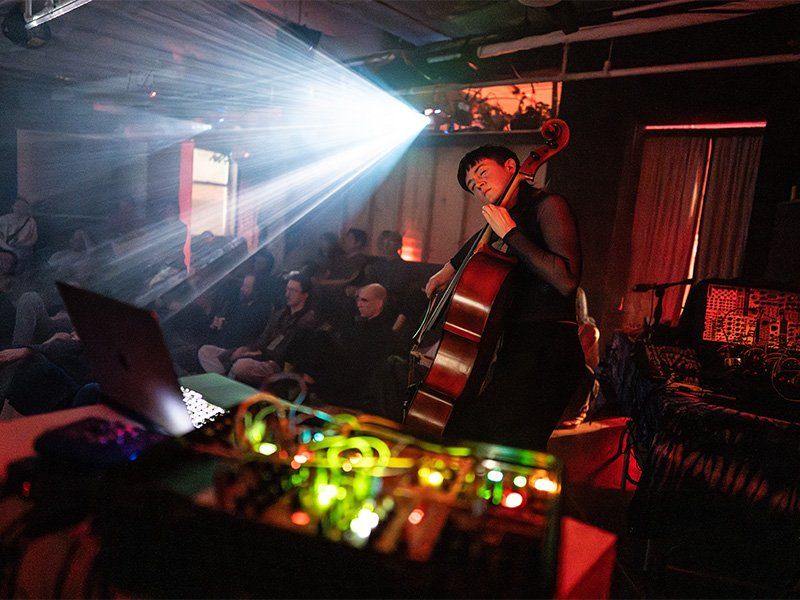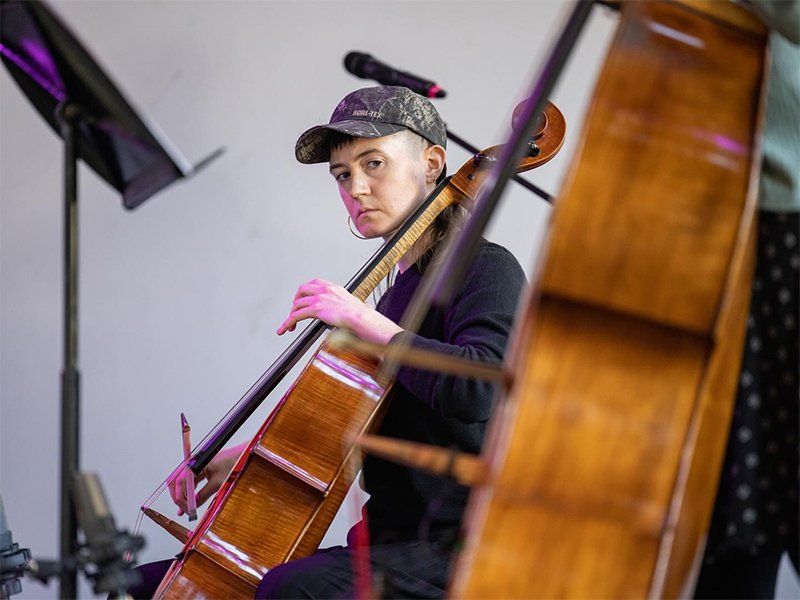
Kirin McElwain
To see Kirin McElwain perform live is to watch a structured and intentional artist navigate cello, synths, and voice with perfect precision. A classically trained multi-instrumentalist, Kirin experiments with breaking the expected forms, negotiating elements of harsh noise with loops of confessional poetry. Her self-released cassette Viriditas was delivered in June 2023, swiftly followed by joining Post Malone's band on NPR's Tiny Desk.
This year, highlights include a performance at the legendary Ambient Church (using a borrowed cello after gear failure), and a remix of Omar Ahmad's "Sham Oasis" for experimental label AKP Recordings. For the introspection that arrives as summer merges into autumn, Mystery Circles is proud to present her new track titled "desiderate"- a soundtrack for discovering what we may desire most.
Carolyn: Tell me about your two instruments. How did you find your way to cello and eventually electronics?
Kirin: I have played the cello since the age of 8 when I began playing in a public school program. I became quite serious about music in high school, and eventually got a Master’s degree in cello performance after completing a liberal arts undergrad.
I’ve always been drawn to electronic music, despite knowing very little about it. I love contemporary classical music and have always enjoyed interpreting works that include some sort of electronic element. Michael Gordon’s gorgeous piece “Industry” for cello and distortion was a formative listening—and later on, performing— experience. I also remember hearing Pan Sonic and Aphex Twin for the first time and knowing that I deeply loved what I was hearing but not understanding why or what I was listening to.
My interest in electronics existed for a very long time in the back of my mind as something that I would never learn about because of the degree to which I had ordered my entire life around cello playing and being a cellist. Finally, over the pandemic I started experimenting with no-input mixing, taught myself Ableton, and eventually took a synthesis class with Sarah Belle Reid. It was also during this time that I realized how creatively frustrated and unsatisfied I had been feeling and decided to focus on making my own work, despite having no composition or writing experience.
C: Cello is a physical instrument and electronics often lack a physicality -- how does it feel moving between the two in a live setting? Do electronics ever feel like an extension of yourself the way a bowed instrument does?
K: I think I began turning to electronics and specifically modular synthesis because there’s no “correct” way to interact with these instruments, which felt like a necessary and welcome change with the ways that I had been taught to interact with sound and behave as a musician in my formal music studies.
Combining the cello, the synth, and adding voice has naturally necessitated some changes in my setup. I perform standing now, which can sometimes make cello playing more challenging but makes it much easier to move between the cello and my other gear on stage. If I’m playing in more traditional settings or in an acoustic duo, I still prefer sitting, but in my amplified work standing feels pretty necessary. I also like that I take up more physical space when I stand.
Related to all of the above is that I strive to bring the same level of body attention and awareness to playing the synth or other electronics or singing as I do my cello playing. Which is to say, I want to be aware of my whole body regardless of what instrument I am playing. Of course this is a practice: I forget, but when I realize I’ve forgotten, I remember again.
C: While in pop culture we are accustomed to session guitarists, drummers and pianists-- you are a session cellist. Tell us about your work with film, television, and on occasion-- Post Malone.
K: Yeah, the session work is something I’ve kind of fallen into but really enjoy. I love working with composers and the challenge of completing a project in what is usually a very compressed time frame. I also find it extremely satisfying to get to the end of a tracking day and be like, “yeah, I completed a project today.” There’s a very clear, tangible result to session work, unlike the workflow for my solo work which tends more towards the messy, the uncomfortable, and the mysterious. I also enjoy getting to contribute a small role in the context of a much larger project, in the case of a TV show or a film.
In terms of my work as a cellist for other artists, I feel lucky to have worked with some incredible performers whose work has a wide reach. In any kind of playing situation–regardless of genre– the most important thing to me is feeling comfortable with the people I’m working with. If the hang is good, everyone will play better, and the gig will go better. I’ve really enjoyed my time in the pop world and have grown a lot as a player and as a working professional from these experiences.
C: You self-released a beautiful and innovative EP last year to cassette called Viriditas. You often use sub-bass and elements of noise in your compositions, ("At the Surface" is a good example) what informs your compositional choices?
K: Thank you for the kind words about Viriditas!
Regarding compositional choices… I improvise a lot and record everything. It’s pretty freeform, and more about just noticing what I’m feeling in the moment rather than trying to “make” something happen.
Usually I know when I’ve stumbled on a sound that I am going to make something with. It’s not about the kind of sound, although I do enjoy “noisier” sounds, but it’s more that a sound will have a certain quality to it that is memorable. Sometimes the sound itself will tell me what it needs, and then other times I’m literally throwing things into Ableton to see if anything clicks. And the best times are when it feels like I am following directions to make something.
In terms of sub bass, the low end is very important to me, both as a cellist and also because I want listening to the music to be a visceral experience.

C: Your track is titled desiderate. A working definition is "to feel a keen desire for" - what are you desiring?
K: I’ve always hated setting so-called “goals.” Desires are so much more interesting. I feel like in present-day productivity speak, a goal is sort of like a sanitized desire. Like, packaging a desire into a more socially-acceptable format. And, at least in my experience-- my desires are very different from what I might say my "goals" are. Desires are more honest. And I think that being honest with yourself can be uncomfortable, but also a potent tool for orienting yourself. All of which is to say that I have many desires and that cultivating a relationship with my desires feels pretty important.
C: You mentioned beginning to use vocals more - how does it feel to add singing to your work? Is it a natural - or potentially uncomfortable feeling? The vocals in “desiderate” are lovely, by the way.
K: It’s pretty wild that I use my voice now. I mean, I hadn’t really sang since I was a little kid. When I started trying to write I was at first working with just cello, and then I added in the electronics and then one day I realized that I could try using my voice as another instrument. The vocal loop from “Work” on my tape was literally the first thing I made using my voice. While some of my music has text in it, I don’t consider them songs with lyrics… all text is improvised and stream of consciousness, and I view it more as another instrument or even just a texture in the mix rather than a focal point in the music. The more I sing, the more I learn about my cello playing; the two practices are so similar to each other.

C: What is next for you as summer transitions into autumn? I know your live show punch card is often booked solid.
K: At the moment, finishing a bunch of new solo music and a couple other recording projects for other people, getting my fall teaching schedule organized, revising my cello octet for some upcoming performances this fall, and planning a recording project with one of my duos. I also want to reconfigure my live setup for some upcoming solo and duo gigs this fall.
I am also trying to get out of the city for a few days. This summer has been really fun and productive, but also a bit of a grind. I’m hoping to visit some family and maybe get up to Vermont for a couple days of trail running and clean air.
C: A softball for a musician constantly traveling - what is the best advice you have for getting around on trains and planes with delicate instruments?
K: If it’s just the cello, getting around is totally fine: the subway is easy to navigate with a cello, or it gets its own seat on the plane. But for solo stuff and this one duo I’m in, I’ve got the cello, the synth, the laptop, a mic, an interface… it’s a lot and I really do not enjoy packing up my gear or carrying it around. I’m working on streamlining how much gear I have with me, but have also been taking more cars to gigs this year, which helps a lot.
Related to the gear-schlepping conversation is that I’m quite dedicated about lying down in semi-supine position on the floor every day and doing some sort of physical activity (running, weights, cycling, stretching) on a regular basis. All of which I think helps my body recover well from traveling with all my gear (…even if I still don’t love carrying gear in the moment!).
Artist Playlist
We asked Kirin to send a playlist of what she’s listening to + inspired by which you can check out on Spotify below